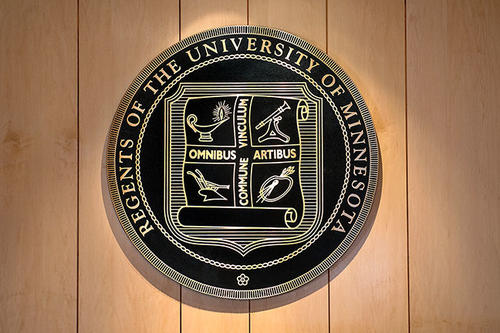
At its last meeting of the semester, the University of Minnesota’s Board of Regents focused on maintaining the strength and excellence of the University. The Board approved the fiscal year 2019 undergraduate nonresident/non-reciprocity (NRNR) tuition rate for the Twin Cities campus, ratified the Administrative Policy: Sexual Harassment, Sexual Assault, Stalking and Relationship Violence and heard the annual report of the University’s research accomplishments.
On Friday, the Board approved a 15 percent tuition increase for nonresident/non-reciprocity undergraduate students on the Twin Cities campus, which will take effect for the 2018–2019 academic year. The Regents affirmed President Eric Kaler’s recommendation of limiting the increase for continuing NRNR students (current freshmen, sophomores and juniors) to 5.5 percent.
“The University continues to provide an outstanding value to students from Minnesota and across the globe,” said David McMillan, chair of the Board of Regents. “The increase in NRNR tuition on the Twin Cities campus is measured and thoughtful, and better reflects the value of a University of Minnesota education."
In conjunction with the NRNR tuition increase, the University may incorporate additional investments toward the recruitment of nonresident students in the recommended fiscal year 2019 operating budget. The University may recommend a combination of increased funding for a discounting strategy for the fall 2018 freshman class targeted to address student financial need and distinguished merit, as well as support for additional recruiters to continue to build pipelines in national markets.
Twin Cities NRNR tuition was discussed in concert with other major variables expected in the fiscal year 2019 operating budget for the University system—including implications of low state funding appropriated during the 2017 legislative session. The Board plans to discuss the budget framework in February 2018 and review the President’s recommended operating budget in May with action anticipated in June 2018.
Administrative Policy: Sexual Harassment, Sexual Assault, Stalking and Relationship Violence
Additionally, the Board of Regents ratified the Administrative Policy: Sexual Harassment, Sexual Assault, Stalking and Relationship Violence. Following a resolution agreement with the U.S. Department of Education Office for Civil Rights, the University developed a single policy to address sexual misconduct and provide detailed information about resources and processes. The policy language has undergone system-wide consultation with a variety of stakeholders, and it was approved by the University Senate in May 2016.
Annual Report on Research & Commercialization of Intellectual Property
The Board heard the annual report of the University’s research and technology commercialization accomplishments during fiscal year 2017, including a discussion of external research funding. University researchers successfully competed for $745 million in externally sponsored research awards in a diverse array of fields, from biotechnology and medical genomics, to regenerative medicine and nutrition. Reflecting a number of University strategies to diversify research funding and attract clinical trials, business and industry funding grew by 3.8 percent, or $3.1 million, and now accounts for more than 11 percent of all externally funded research.
The National Institutes of Health continued to be the University’s largest funding source. On the recipient side, the Medical School received $211 million, the largest share of external awards among University colleges, and an increase of $29.5 million, or 16.2 percent.
The University also maintained its rank of eighth among US public research universities, according to the latest National Science Foundation survey, with $910 million in research expenditures on the Twin Cities campus ($940 million, all campuses) in fiscal year 2016.
The full 2017 Annual Report on the Status of University Research & Commercialization of Intellectual Property is available online.
The Board also:
- Discussed student of color and American Indian student recruitment and retention efforts on the Twin Cities campus. Regents also discussed strategies to reduce the four- and six-year graduation rate gaps for African-American and Latinx students
- Approved the employment agreement for Dr. Jakub Tolar, dean of the Medical School and interim vice president for Health Sciences. Additionally, the Board approved an amendment to the employment agreement for P.J. Fleck, head coach for Gopher Football, adding one year to Coach Fleck’s existing employment agreement with the University.
- Reviewed the 2017 University Plan, Performance, and Accountability Report, the annual report that serves as a reference guide to the University’s progress toward mission-related strategic goals. The discussion included an overview of additional benchmarking data relevant to System-wide Strategic Planning, highlighting significant trends with respect to the state of higher education in Minnesota, enrollment management, as well as comparison groups of the University of Minnesota system.
- Received the annual financial report. The annual financial report presents the financial position and results of operations for the University of Minnesota for fiscal year 2017, with comparative data for fiscal year 2016.
The Board will meet next on February 8 and 9, 2018. Go to regents.umn.edu for more information.
- Categories:
- Campus Affairs





